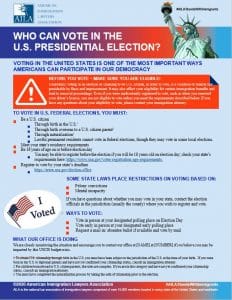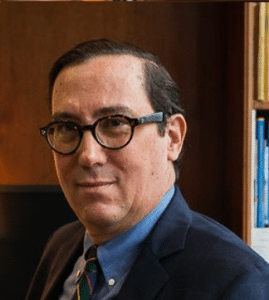See our official newsletter and subscribe: https://conta.cc/3n6nQtD
GYH Proudly Welcomes Esteemed International Human Rights Lawyer, Carlos Ayala, as Of Counsel
GYH’s INTERPOL Defense and international human rights law practice welcomes Venezuelan attorney Carlos Ayala as Of Counsel. Ayala is a Partner at the leading law firm Consultores Jurídicos in Caracas and he is globally recognized as a top-notch human rights advocate and publica international law expert before various national and international organizations; advisor to numerous international organizations and non-governmental organizations; and author of several publications on Constitutional Law, Human Rights and International Public Law. Ayala is currently the Vice President of the International Commission of Jurists, a worldwide organization with headquarters in Geneva and with offices and active work in all continents. Mr. Ayala is the head of the Constitutional Law Chair at the “Andrés Bello” Catholic University, Professor of Human Rights at the University of Oxford (UK), Georgetown University, American University Washington of College of Law (USA), and Pan American University (Mexico), among numerous other prestigious constitutional and human rights organizations. Mr. Ayala was chair of the Organization of American States (OAS) Inter American Commission on Human Rights. He was a member of the International Commission appointed by the United Nations High Commissioner for Human Rights, for the selection and appointment process of the Supreme Court of Ecuador in 2005. As a Consultant for the United Nations, Professor Ayala also worked on the selection process of the Supreme Court of Justice of Guatemala in 2009.
Ayala has litigated several landmark cases before the Commission for the Control of INTERPOL’s Files (CCF), the United Nations Human Rights Committee and the Working Group on Arbitrary Detention, as well as the Inter American Court and the Inter American Commission on Human Rights (OAS). In the field of international protection of foreign investments, Ayala has been an independent expert in several cases domestically and internationally (ICSID).
Ayala will work closely with GYH attorneys to defend victims of human rights abuses before the CCF, the United Nations Human Rights Committee and the Working Group on Arbitrary Detention, as well as numerous other international organizations and tribunals. Ayala’s breadth and depth of experience, as well as his superb reputation will help further GYH’s ability to successfully advocate for its clients, facing human rights injustices.
Carlos Ayala is recognized by the Legal 500 and ranked as a “Star Lawyer” and “Band 1” in Public Law by Chambers & Partners.
Global Mobility & Outbound Immigration
In addition to its full-suite of U.S. immigration services, Grossman Young & Hammond offers global mobility support and non-US immigration services around the globe. Our services include securing employment visas, work and residency permits and business visas for individuals and businesses looking to relocate out of the United States.
If you are interested in relocating out-bound immigration advice and counsel please email info@grossmanyoung.com to learn how GYH can help.
Policy Updates
Breaking: Federal Judge Blocks USCIS Fee Increases
A federal judge granted a motion for a preliminary injunction against the expansive U.S. Citizenship and Immigration Services (USCIS) fee increases scheduled to take effect on October 2. The final fee rule would increase USCIS fees by a weighted average of 20% and add new fees for certain benefits.
On September 29, Judge Jeffrey S. White of the Northern District of California blocked the Department of Homeland Security (DHS), USCIS “from implementing or enforcing the Final Rule or any portion thereof.”
Judge White ruled in favor of an injunction on the basis that Kevin McAleenan, former acting Secretary of DHS, and Chad Wolf acting Secretary of DHS, were not lawfully serving under the Homeland Security Act (HSA). Judge White also determined the rule violates some procedural and substantive requirements of the APA (Administrative Procedure Act) by failing to disclose and explain data and ignoring data on record. The defendants argued that the fee increases would not impact demand for immigration services but the Judge decided DHS failed to provide data in support of those claims. Specifically, The Court found that “the Final Rule is arbitrary and capricious” in its “failure to consider important aspects of the problem, including the negative impact the rule will have on low-income immigrant populations.” Finally, Judge White ruled that the Trump administration had not adequately justified the policy shift.
The government is expected to appeal the injunction.
Ruling Says Trump May End TPS
A Monday ruling by the 9th U.S. Circuit Court of Appeals in California effectively allowed the Trump administration to move forward with plans to end Temporary Protected Status (TPS) for over 300,000 people in the U.S. The ruling lifted an injunction that prevented the Administration from terminating deportation protections for people from Sudan, Nicaragua, Haiti and El Salvador. Attorney Elana Gold explains the court’s decision and how it could ultimately affect over 300,000 immigrants.
Public Charge Reinstatement
The Trump administration announced on Tuesday, September 22nd its plans to reimpose its new guidance surrounding Public Charge. United States Citizenship and Immigration Services (USCIS) is reinstating the guidance following a September 11 decision that stayed an injunction blocking the administration from proceeding on the grounds that it was hampering efforts to contain the pandemic.
The Public Charge final rule and related guidance will apply to all applications postmarked on or after February 24, 2020. USCIS will not re-adjudicate any applications and petitions that were approved following the issuance of the July 29, 2020 until September 22, 2020.
USCIS guidance explicitly states that applicants who filed a Form I-485, Application to Register Permanent Residence or Adjust Status, after Feb. 24, 2020, may be required to file Form I-944, Declaration of Self-Sufficiency. I-485 forms received before Oct. 13, 2020, that do not have all required forms and evidence, will be followed by requests for any missing forms and evidence. After Oct. 13, 2020, USCIS will reject Form I-485 if it does not include the required forms and evidence at the time of filing.
USCIS will also request missing evidence for Form I-129, Petition for a Nonimmigrant Worker; Form I129CW, Petition for a CNMI-Only Nonimmigrant Transitional Worker; Form I-539, Application to Extend/Change Nonimmigrant Status; and Form I-539A, Supplemental Information for Application to Extend/Change Nonimmigrant Status.
If you are concerned that your or your employee’s case may be impacted by this guidance, reach out to us at info@grossmanyoung.com or by calling 240-403-0913 to schedule a consultation.
Voter Eligibility Requirements
Voting is the most important way U.S. citizens participate in our democracy. This American Immigration Lawyers Association infographic outlines voter eligibility and tips for election day.




